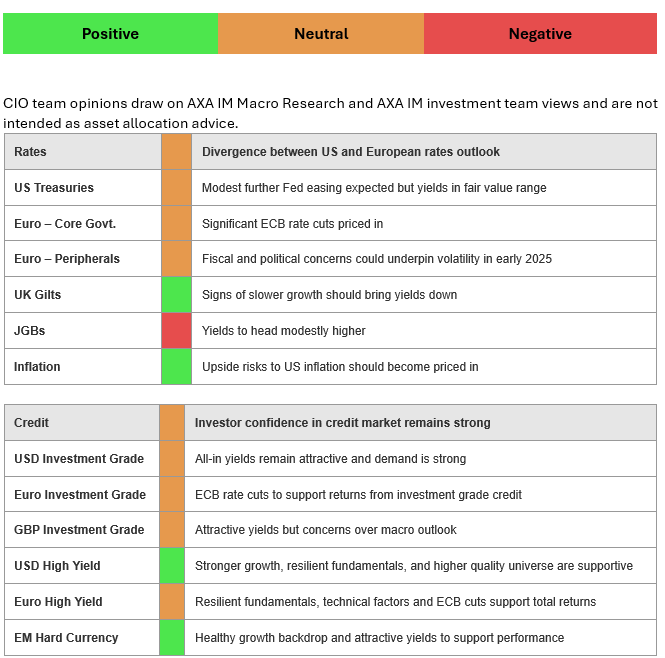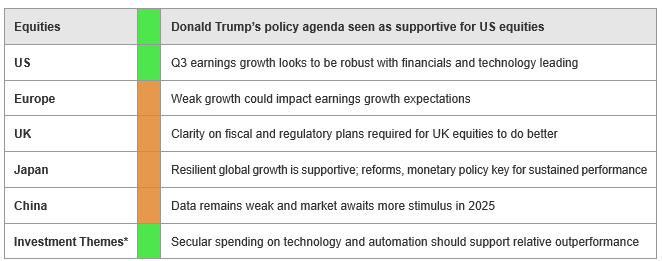Investors upbeat on pricey US equities while Europe offers value
US equities: Price vs. value
A recurring investor concern is the US equity market’s valuation. In 2024 the blue-chip S&P 500 index reached multiple new highs while the excitement around generative artificial intelligence saw the tech-heavy Nasdaq 100 index also make considerable gains. As a result, the US is by far the most expensive major equity market. But valuation is no guarantee of future returns.
Investors appear bullish on US equities with earnings growth expected to be 14% over the next year and President-elect Donald Trump’s policy agenda is supportive. But prices could adjust quickly if the sentiment deteriorates. There are cheaper equity markets – European and Asia. Importantly, US Treasuries, like other government bonds, have cheapened on a relative value basis compared to corporate bonds. Could a rotation out of stocks into bonds be one of 2025’s surprises?
No ‘surprise effect’ in 2025
During the past 24 months, we’ve seen US economic growth estimates significantly repriced. For example, consensus expectations for 2024 in late 2023 was for 1.3% but it’s probably closer to 2.7%. However, the consensus might have improved substantially both in macroeconomics and market terms for 2025. US GDP forecasts are starting from a higher base - consensus forecasts are at 2.1% growth (AXA IM forecasts 2.3%).
Bloomberg, median expectations for the S&P 500 are at 6,600 points at the end of 2025 - quite a mood shift from a rather downbeat initial expectation for the end of 2024 at 4,800 points. Therefore, we might have to live without the recent ‘surprise effect’. This doesn’t necessarily mean the market’s performance will disappoint in 2025, but the bar for another result of 20% plus is unmistakably high.
Multispeed in a multipolar world
Diverging global economic policies and geopolitical dynamics continue to influence Asia’s economies. As a result, monetary policymakers will need to be astute. India is experiencing a slowdown in industrial activity, consumption and private investment, and lower interest rates may be warranted. Inflation, however, is above target and subject to large weather-related shocks in food prices. More positively, as one of Asia’s most domestically oriented economies, it is less susceptible to global trade tensions.
South Korea faces several challenges – alongside the current political uncertainty, it must tackle global manufacturing weakness and slow domestic demand as well as uncertainty over the impact of likely US tariffs. Taiwan appears more resilient, benefiting from semiconductor demand thanks to ongoing growth in artificial intelligence. Taiwan’s central bank has a limited scope to cut interest rates, in part due to the level of borrowing in the residential property market.
Asset Class Summary Views
Views expressed reflect CIO team expectations on asset class returns and risks. Traffic lights indicate expected return over a three-to-six-month period relative to long-term observed trends.


*AXA Investment Managers has identified six themes, supported by megatrends, that companies are tapping into which we believe are best placed to navigate the evolving global economy: Technology & Automation, Connected Consumer, Ageing & Lifestyle, Social Prosperity, Energy Transition, Biodiversity.
5 topics

